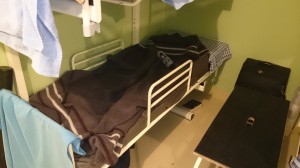After a brief stop at the RSPSoc conference, Andrew McClune took the long journey from Aberystwyth to Zurich for the ISPRS Commission III midterm symposium entitled ‘Photogrammetric Computer Vision’ (PCV), which was held and organised by ETH Zurich in conjunction with the European Conference on Computer Vision (ECCV) 2014. With there being a large overlap between many photogrammetric tasks and the applicability of computer vision approaches, this was a perfect opportunity for academics and industries to present and discuss research on many topics including machine learning, artificial intelligence, robotics, photogrammetry and geosciences.
With Zurich known for its lavish lifestyle with a vast amount of expensive hotels, accommodation was offered by the organisers in one of Zurich’s luxurious air bunkers. These offered an ideal location being close to the city centre and the free transport passes for delegates meaning getting to and from them was a breeze. Whilst the beds and the facilities were not the most accommodating, it gave the opportunity for young researchers from all over the world to meet and discuss their research.

Over 150 international delegates attended the three day PCV conference from 5th September. After an address from ISPRS general secretary, Christian Heipke, a series of oral presentations were given on stereovision and building reconstruction. Keynote presentations came from Andrew Davison, of Imperial College London, presenting work on SLAM and Michael Goesele, of TU Darmstadt, who presented photogrammetric reconstruction of real world scenes. Other technical session during the conference included scene interpretation, pose estimation and performance evaluation. During the poster session Andrew presented work on extracting and integrating data from multi-ray photogrammetry for 3D building reconstruction. A copy of Andrew’s Poster can be viewed on the following link.
Of the attendees at PCV, 60% took advantage of the reduced conference rates and also attended ECCV, where more than 1400 delegates were in attendance. ECCV started with a series of workshops on the 6th and 7th September where keynote speakers presented sessions on various topics including UAVs, scene analysis and object tracking. The conference officially opened on the 8th September. Whilst keynote addresses were presented in the workshops, the following four days of the conference saw over 350 posters and nearly 40 oral presentations. The main topics of focus were face detection, human pose estimation, and segmentation of RGBD imagery as well as some more abstract work including smart car headlights and using computer vision to measure the carbohydrate content in a meal. One oral session focussed on Structure from Motion (SfM), which is becoming very popular in photogrammetry, and several posters presented research using SfM for the registration and 3D reconstruction of Flickr based images, real-time mobile imagery and videos. Many companies were also in attendance to discover the latest research and also present how computer vision was being used within industry for dentistry, visual simulation with detected humans as well as many UAVs based projects including Amazon’s UAV delivery service. ECCV was drawn to a close on the 11th September with a short presentation from next year’s organisers in Amsterdam, before a final day of workshops.
